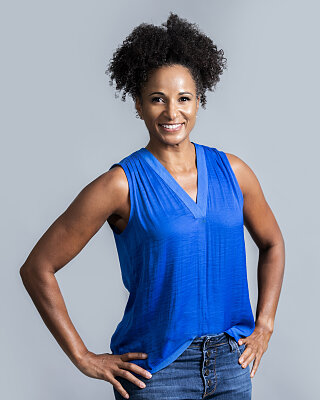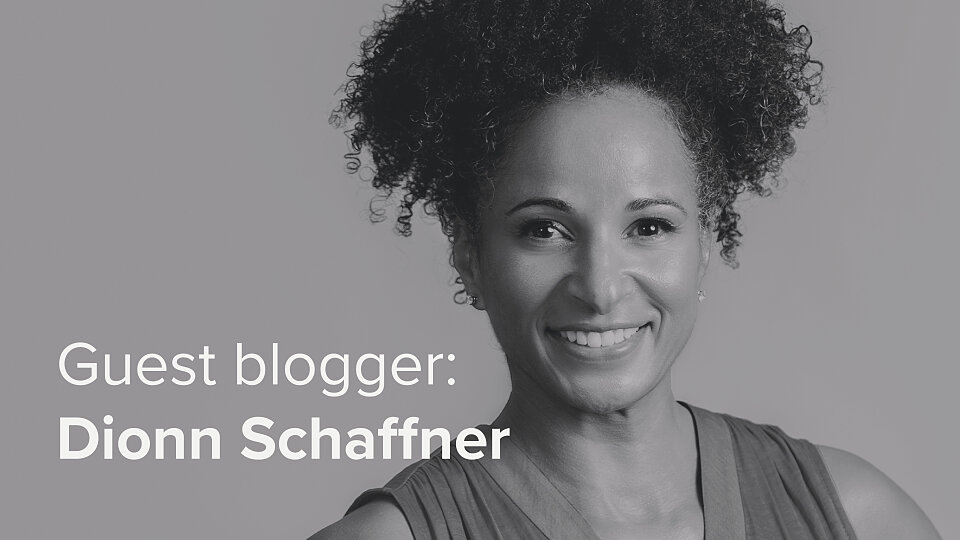Black History Month: Q & A with Dionn Schaffner
In honor of Black History Month, we asked our Board Member, Dionn Schaffner, to answer a few questions about the overlap of race equity issues and our child welfare system. Read her insights on these 3 important questions below.
- Why do you think Black History Month is important to acknowledge in child welfare?
- How can we as a community move the needle toward a more informed and equitable approach to caring for children and families in crisis?
- What advice would you give to new transracial families? How can these parents honor their children’s culture/heritage?
Hi! I’m Dionn Schaffner, a single moth er living in Austin with my two teenage sons, my dog, and my cat. In addition to earning my MBA from Stanford University’s Graduate School of Business and my BS in Computer Science from Stanford University’s School of Engineering, I have over 25 years of experience ranging from software development to marketing strategy and operations to management consulting.
er living in Austin with my two teenage sons, my dog, and my cat. In addition to earning my MBA from Stanford University’s Graduate School of Business and my BS in Computer Science from Stanford University’s School of Engineering, I have over 25 years of experience ranging from software development to marketing strategy and operations to management consulting.
I transitioned out of the corporate life with a civic mindset - focused on using my education, experience and expertise - to do inspiring work to help repair the tears in our society through spirited advocacy and volunteer roles as an Advocate with CASA of Travis County, the Founder/President of Geri’s Locker, and a member of both Leander ISD’s Equity and Diversity Community Council and Representative Vikki Goodwin’s Anti-Racist Advisory Group. After supporting Foster Village as a volunteer through Geri’s Locker, I was excited to join the Board of Directors for Foster Village to further support their mission.
Why do you think Black History Month is important to acknowledge in child welfare?
Black History Month is important to acknowledge in child welfare from two perspectives. For the Black children, who are over-represented in the system, creating, developing and supporting racial and ethnic pride promotes healing from racial traumas and supports positive self-identity.
Not only are Black children over-represented in the system, but they are racially under-represented by the number of child welfare system workers from CPS caseworkers, attorneys, judges, volunteer advocates and foster placements. When they are taken from their families and brought into the system, and look around, there is rarely anyone who looks like them. For child welfare workers and volunteers, recognizing and understanding this disparity is step one. Gaining cultural awareness and intelligence is the next step, and Black History Month is a great impetus and opportunity to do so.
Black History Month not only celebrates and honors Black legacy, but it educates and corrects stories and facts that were previously not shared about Black history accurately in our society. It brings forward voices that have historically been silenced or misrepresented in order to keep the hierarchy of privilege. Child welfare is fraught with systemic biases against Black families. The knowledge and perspectives potentially gained by participating in Black History Month can be an integral part of dismantling those biases.
What doesn’t get talked about, doesn’t get addressed. Let’s talk about real Black History!
Many of the families we serve are white foster parents who open their homes to children of color. What advice would you give to new transracial families? How can these parents honor their children’s culture/heritage?
First and foremost, see color. Being “color-blind” dismisses, ignores, and attempts to invalidate the past, current and future pains and struggles our children of color face. Being “color-blind” also does not allow the child to celebrate and embrace their heritage and culture. Seeing color allows us to acknowledge the challenges and celebrate the differences.
Once you see color, become not just a caregiver, but an ally. Educate, Empathize, Engage and Expect.
- Educate – Educate yourself on the child’s culture and heritage. There are many resources available from reading materials, podcasts, movies and more. Your favorite bookstore or streaming service has curated content, not just during Black History Month. Try not to put the weight of your education on the child. They are already shouldering so much between the inequities of discrimination to now the separation from their family….we don’t want to add educating someone else on their plates as well.
- Empathize – Acknowledge the child's experience and emotions; their perception is their reality. Understand the challenges they can, and most likely will, face in our society. Listen to their stories. As Seth Godin says, “Listening happens when we put in the effort to understand what the words mean….it requires a commitment to encountering the experience, intent and emotion behind the words.” There is no substitute for lived experience and if they are willing to share with you, they are offering a moment of vulnerability and trust in you.
-
Engage – Actively seek out opportunities to celebrate and honor the child's heritage, not just during Black History Month, but year-round.
- Find communities of color to engage in. Representation matters, even in the resources you provide, from barbershops and salons to books with Black protagonists to clothes you provide. Basic elements, like how they can wear their hair can make a significant impact in how they view and feel about themselves and their culture.
- Help them see successful versions of themselves in the world around them. Proactively seek out and point out others who share their culture and heritage being successful, overcoming trials and hardships, and navigating society. The child will need these types of resources and demonstrated resiliency to operate in a world still entangled with systemic biases and racism.
- If you can, check in with the birth family and learn whatever rituals they support as a family. Keeping this type of connection to their heritage can be enduring.
- Expect – Expect to have some hard conversations. Even when you are trying your best to educate, empathize and engage, hearing the words “You don’t know what it’s like…” can sting in their unfortunate truthfulness. Breathe. Consider the feelings at stake here, acknowledge their truth and their reality and try again, knowing you are coming from a place of good.
As you have mentioned previously, research shows us that there is a disproportionately high rate of Black, Indigenous and People of Color (BIPOC) who intersect with the child welfare system, especially in Central Texas. How can we as a community move the needle toward a more informed and equitable approach to caring for children and families in crisis?
At every stage of the child protective continuum, Black children are over-represented and under-served: they are more likely to be reported to agencies as suspected victims of maltreatment, more likely to be investigated, and more often forcibly removed from their homes. Once in foster care, Black children remain for longer and are less likely to be reunified with their parents.
In Trauma-Informed Advocacy, we focus on addressing the underlying trauma to find healing paths versus punitive action for undesired behaviors. By identifying the instigating crisis and finding supports for the crisis, we can limit the need for removal and potentially decrease the number of children in the system from the start.
As a community, we need to look at each and every stage and recognize systemic biases and dismantle them. Sometimes it can be as simple as recognizing poverty does not equal neglect. When possible, focus on supporting the family vs separating the family. Several initiatives are coming up in the legislative process that we as a community could support, including Collaborative Family Engagement, the Federal Family First Prevention Services Act, Preparing for Adult Living (PAL), and Community-Based Care.
Ultimately, in many cases, families are simply doing the best they can with the knowledge, experience and resources they have. If we, as a community, can intervene with supports in these three areas, we can change the trajectory of not just the family of today, but for the generations to come.
A big thank you to Dionn for helping bring awareness around this important topic. Let's continue to work together as a community to provide support and bring awareness. If you have any quesitons, or want to learn more, please contact us.


